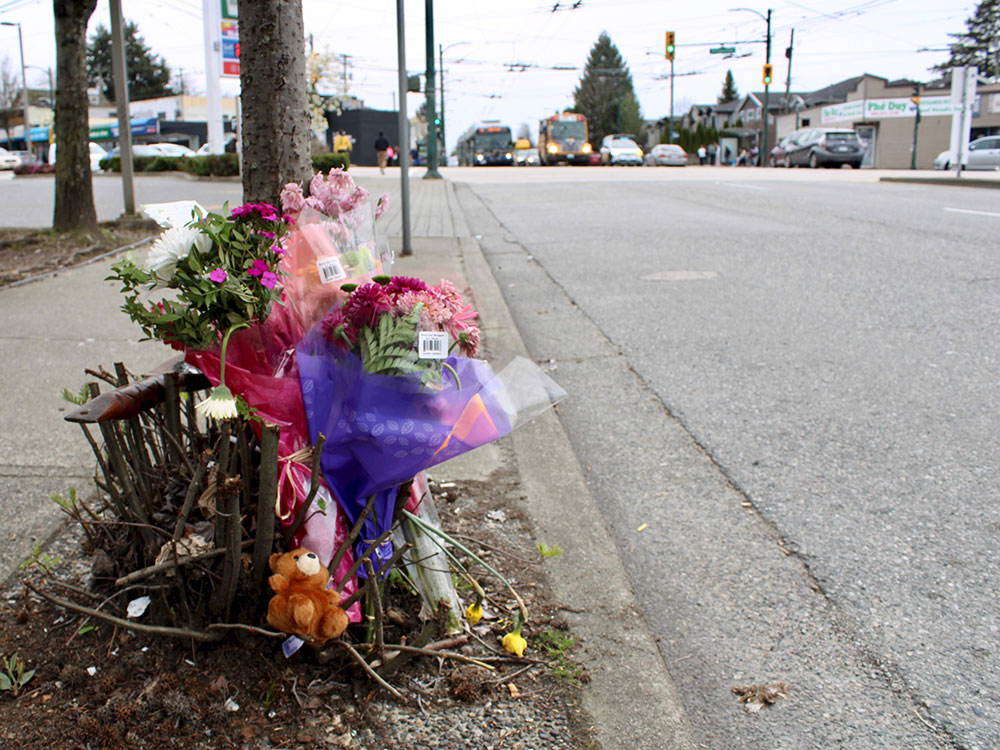Flowers marked the spot where a 37-year-old Indigenous woman was found dying on a Vancouver sidewalk just before dawn on March 30. Despite first responders’ efforts, she died at the scene.
Two weeks after her death, an advocate for abused women is calling for transparency around the disturbing death, noting police have released little information.
The Vancouver Police Department released video on April 4 of a black vehicle making a U-turn in front of what appeared to be a pixelated shape, and are asking the public to contact the VPD if they have any information about the vehicle.
Angela Marie MacDougall, the executive director for Battered Women’s Support Services, said she would like to know more about the circumstances of the woman’s death and the police investigation.
“We have another potential femicide,” she said. “I want to know more about the details.... What are the factors around this woman’s death? And then also, what are the police doing or not doing? And what are the factors that we need to be thinking of in terms of looking at the broader issues around gender-based violence, femicide, intimate partner violence and sexual assault?”
So far police have shared none of those details, saying the cause of death has not yet been determined. Police have also not released the woman’s name or whether her death is being investigated as a homicide.
The Tyee visited the scene of the woman’s death on April 4 and found a memorial of flowers at the spot where she died in front of the Greater Vancouver Baptist Church at 4440 Victoria Dr.
A note on one of the bouquets read, “Oh my baby girl know that you were and always will be loved and missed forever. RIP, love Mom.”
First Nations, Métis and Inuit women are 12 times more likely to be murdered or go missing than non-Indigenous women, according to the National Inquiry into Missing and Murdered Indigenous Women and Girls.
Indigenous women are six times more likely to be murdered than non-Indigenous women, according to Statistics Canada. Those homicides are less likely to be solved by police, and when charges are laid, a first-degree murder charge is less likely compared with non-Indigenous victims.
Advocates have also tracked a sharp increase in the number of women killed in Canada since the start of the COVID-19 pandemic. In 2019, 136 women were killed by violence in Canada, according to numbers tracked by the Canadian Femicide Observatory; in 2023, 187 women were killed, a 36 per cent increase compared with 2019.
Vancouver police are also investigating what they say is a “targeted” homicide of a 49-year-old woman who was discovered on April 3 at Rosemont Drive and East 57th Avenue in South Vancouver.
MacDougall said she keeps a close eye on police investigations into the deaths of Indigenous women.
She said it’s also important to get information on the identity of the women, in order to track whether they were receiving services from various organizations and what help they may have been lacking.
“There are still a number of suspicious deaths of Indigenous girls and women that have not received, from our point of view, the level of police intervention and transparency that we expect,” MacDougall said. ![]()
Read more: Indigenous, Rights + Justice, Gender + Sexuality

















Tyee Commenting Guidelines
Comments that violate guidelines risk being deleted, and violations may result in a temporary or permanent user ban. Maintain the spirit of good conversation to stay in the discussion and be patient with moderators. Comments are reviewed regularly but not in real time.
Do:
Do not: